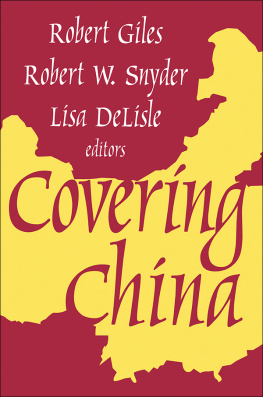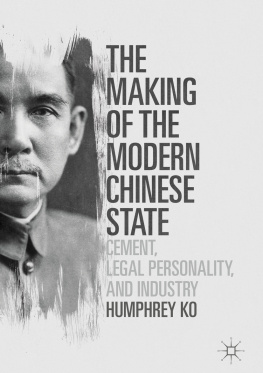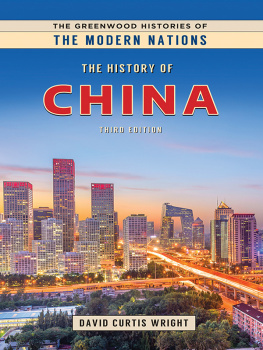Covering China
Media Studies Series
1968: Year of Media Decision
edited by Robert Giles and Robert W. Snyder
Americas Schools and the Mass Media,
edited by Everette E. Dennis and Craig L. LaMay
Children and the Media,
edited by Everette E. Dennis and Edward C. Pease
Covering China,
edited by Robert Giles, Robert W. Snyder, and Lisa DeLisle
Covering Congress,
edited by Everette E. Dennis and Robert W. Snyder
The Culture of Crime,
edited by Everette E. Dennis and Craig L. LaMay
Defining Moments in Journalism,
edited by Nancy J. Woodhull and Robert W. Snyder
Higher Education in the Information Age,
edited by Everette E. Dennis and Craig L. LaMay
Journalists in Peril,
edited by Nancy J. Woodhull and Robert W. Snyder
The Media in Black and White,
edited by Everette E. Dennis and Edward C. Pease
Media and Democracy,
edited by Everette E. Dennis and Robert W. Snyder
Media Mergers,
edited by Nancy J. Wood hull and Robert W. Snyder
Media and Public Life,
edited by Everette E. Dennis and Edward C. Pease
Profiles in Journalistic Courage
edited by Robert Giles, Robert W. Snyder and Lisa DeLisle
Publishing Books,
edited by Everette E. Dennis, Craig L. LaMay, and Edward C. Pease
RadioThe Forgotten Medium,
edited by Edward C. Pease and Everette E. Dennis
Reporting the Post-Communist Revolution
edited by Robert Giles, Robert W. Snyder, and Lisa DeLisle
Whats Fair? The Problem of Equity in Journalism
edited by Robert Giles and Robert W. Snyder
Whats Next? The Problem and Prospects of Journalism
edited by Robert Giles and Robert W. Snyder
Robert Giles
Robert w. Snyder
Lisa DeLisle
editor
Covering China
Originally published in the Media Studies Journal, Winter 1999. Copyright 1999 by The Freedom Forum Media Studies Center and The Freedom Forum.
Published 2001 by Transaction Publishers
Published 2017 by Routledge
2 Park Square, Milton Park, Abingdon, Oxon, OX14 4RN
711 Third Avenue, New York, NY 10017, USA
Routledge is an imprint of the Taylor & Francis Group, an informa business
Copyright 200 I by Taylor & Francis.
All rights reserved. No part of this book may be reprinted or reproduced or utilised in any form or by any electronic, mechanical, or other means, now known or hereafter invented, including photocopying and recording, or in any information storage or retrieval system, without permission in writing from the publishers.
Notice:
Product or corporate names may be trademarks or registered trademarks, and are used only for identification and explanation without intent to infringe.
Library of Congress Catalog Number: 00-068278
Library of Congress Cataloging-in-Publication Data
Covering China I Robert Giles, Robert W. Snyder, Lisa DeLisle, editors.
p. em.
Originally published in the Media studies journal, Winter 1999.
Includes bibliographical references and index.
ISBN 0-7658-0677-0 (pbk. : alk. paper)
I. China-Press coverage-United States. I. Giles, Robert H., 1993-11. Snyder, Robert W. III. DeLisle, Lisa. IV. Media studies journal.
PN4888.C58 C68 2001
070.449951-dc21
00-068278
ISBN 13: 978-0-7658-0677-2 (pbk)
We gratefully acknowledge the editorial advice of Jonathan Sanders, Larry McGill, Rick Hornik, Kelly Haggart, Bette Bao Lord, Arnold Zeitlin and Jan Berris, We also thank Francine Abdowfor her design modifications.
Contents
Jeffrey N. Wasserstrom
Eighty years after the events of 1919, in a year of anniversaries when many of the debates closed off a decade ago are likely to be reopened with renewed vigor, the May 4th legacy should matter to everyone in the outside world who is interested in Chinas prospects for becoming a freer place, writes a historian.
Stephen MacKinnon
Overly romantic reporting about China in the 1930s and 1940s, a vital period in Chinese political history and Sino-American relations, a historian argues, launched the roller coaster ride that has characterized the U.S.-China relationship and news media coverage ever since.
Seymour Topping
We should have learned, writes a journalist who covered the fighting between the Nationalists and Communists, that firepower in a civil war is not enough to prop up a regime that lacks popular support.
Tsan-Kuo Chang
During the years when China was closed to American reporters, a professor argues, the dependency of American journalists on sources in Washington and their exclusion from Beijing in China reporting represented a journalistic deference to governmental politics.
Jaime A. FlorCruz
A correspondent in Beijing surveys the Chinese media 10 years after Tiananmen: The vibrance, diversity and enterprise of newspapers, magazines and television shows reflect growing pluralism and Beijings inability to control it.
Peter Conn
For two generations of Americans, Buck invented China, writes an English professor. Whatever the strengths or limits of her Asian images, she was a pioneer, introducing American readers to landscapes and people they had long ignored.
Carolyn Wakeman
Ten years after the suppression of the democracy movement, a journalism professor notes that the events of 1989 shape American stories about China only intermittently: The omission signals recognition that China has changed dramatically since 1989 as well as a growing convergence of editorial sentiment with foreign policy, or at least a grudging acceptance of the Clinton strategy of constructive engagement.
Philip J. Cunningham
A reporter in Beijing compares coverage of the Clinton scandal in official Chinese media and tabloids and concludes, If the way China looks at America is compared to the course of a great sailing ship, the vast populace on the decks remains forward-looking and even-keeled in the water, even if the government, perched way up on the masts, rocks back and forth, ordering zigzags due to changes in the wind.
Dai Qing
In modern China, the phrase guiding public opinion is still heard and promulgated on the evening news and read in the papers, writes a Chinese journalist and dissident. With 4,000 years of civilization, China has consistently produced leaders and advisors who seem especially artful in using language to their advantage, understanding all too well that cruel and brutal rule must be glossed over with a soft veneer.
Ying Chan
Eighteen months after Hong Kong was returned to Chinese rule, dire predictions of the demise of press freedom in this former British colony have not materialized, writes a Hong Kong correspondent. Poised between China and the outside world, Hong Kong is still playing its traditional role of a bridge that enables the Chinese to understand themselves and the rest of the world to understand China.
Interview with Orville Schell
Freedom to thinknot just to write what you want but to enable the mind to become an imaginative apparatus that can think what it wants is very precious, says a journalism school dean with a long interest in China. It is not something that comes easily in China or any totalitarian or communist society.







